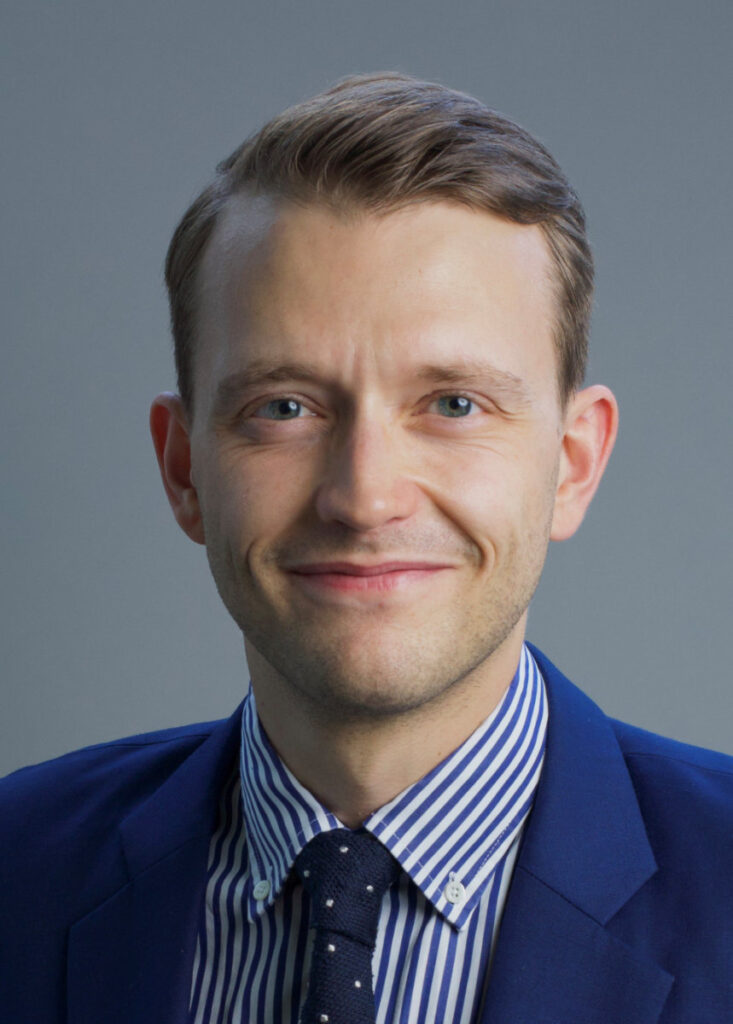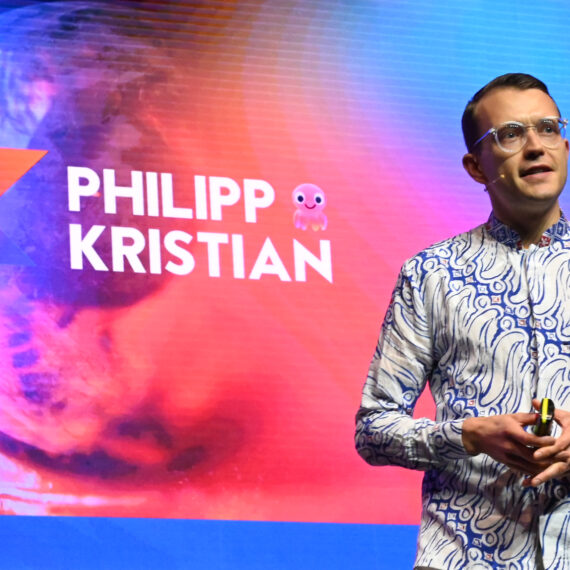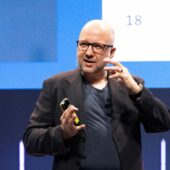Instead of being afraid of artificial intelligence and innovation, we should at least give them a chance and make an intentional effort to trust them. At the Swisscom Business Days 2023, expert Philipp Kristian presented eight strategies to reduce mistrust and establish a sustainable trust culture.
‘We’re in the park and there’s a squirrel. We patiently extend our hand, offering it some nuts. It hesitates, comes closer and then suddenly disappears. We wonder why – after all, we didn’t mean it any harm.’ Trust expert Philipp Kristian likes animals. And he thinks in images. He often elucidates his theories using metaphors and comparisons – such as the squirrel at the start of his keynote speech at the Swisscom Business Days 2023.
ReThink workshop
In the ReThink workshop, you can determine your digital maturity and plan your digital journey.
So, what’s the moral of the story? ‘It’s wonderful to be trustworthy. But that does not automatically mean the squirrel will eat from our hands. That requires trust,’ said Philipp Kristian. According to the expert, both trustworthiness and trust are needed in order to succeed in the future. What’s more: ‘It’s only when we trust that we can also act. Innovation and progress are the result of action.’
Trust leaps
As people, we can look back on countless milestones, or trust leaps as Philipp Kristian calls them. With such trust leaps, putting theory into practice sometimes requires a bit of impetus, for instance if our usual approaches no longer work, our competitors overtake us or time runs out and the status quo threatens our existence.
There are many examples of this: nomadic life was followed by settlement building and agriculture, the carriage was replaced by the motor vehicle, and regionalism gave way to globalisation thanks to innovative new technologies. ‘The most formative trust leap in recent decades has been from traditional corporations to digital platforms. These have enabled us to trust people all over the world and to do business with each other thanks to trusted digital intermediaries. We also call this the trust economy.’
What these trust leaps all have in common are smooth transitions: we live simultaneously in the structures of the past and of the future. At the moment, people have one leg in the offline world and another in the online world, swaying back and forth between human and artificial intelligence. ‘To ensure that things go as smoothly as possible, we need to build bridges – while continuing to maintain everything from the offline world that is also useful in the digital age,’ says Philipp Kristian.
‘Trust is at the heart of progress.’
Philipp Kristian
Action, not reaction
We live in both the old and the new digital world and face the conflict of balancing these two worlds on a daily basis. ‘People naturally like to trust. And this is particularly facilitated in the digital world because it makes life easier in many areas,’ says Philipp Kristian. The offline world, on the other hand, is more complex, and change is not so easy. The complexity that results from connecting our offline and online worlds fuels mistrust and stifles innovation. Why? Because it makes us passive and reactive. ‘We have to act rather than react, simply tackle the new.’ For companies, this means trusting their own employees and thus creating a basis for action rather than just reaction.
But how exactly can companies build trust and open up to the future?
Eight strategies to build trust
- Streamline administrative processes: Use data and digital infrastructure to eliminate repetitive administrative activities that are viewed negatively.
- Focus on the goal: Align processes with a practical result or goal rather than a theory to reduce the gap between theory and practice.
- Build up gradually: Gain experience with ‘trust on advance’. Rather than striving to achieve everything at once, take a step-by-step approach. Then build on each success. If something goes wrong at first, treat it as a learning moment rather than a problem.
- Unite generations: Harmonise trust models between generations and functions and find a common denominator that is relevant for all. This unites us in a similar way to the effect of sharing stories around a campfire since time immemorial.
- Act rather than react: Provide resources for employee initiatives with little red tape, such as brainstorming workshops or trying out new technology tools. Anything that is proactive and in the interest of the collective encourages activity.
- ‘We’ instead of ‘I’: Trust is always a team issue. When we focus on individual development, internal competition quickly results.
- Balance trust and trustworthiness: Traditionally, trust is mistakenly understood only as trustworthiness. We have to balance trust and trustworthiness and ensure they move in lockstep, i.e. reconcile trustworthiness (the intention) and trust (the action).
- Honour intuition: Appreciate the inner knowledge and individual talents of employees as a source of value creation, innovation and future orientation. Pay attention to these and allow room for development.
‘When trust seems impossible, mistrust becomes a means of protecting ourselves,’ says Philipp Kristian. ‘Trust enables us to break down this protective function in order to build bridges, which then leads to the creation of new things through exchange and collaboration.’ A solid foundation is created when mistrust is reduced and trust is built, and we remain on safe ground as a company and as mankind.
ReThink Workshop
Let’s ReThink – transformation means trust. In digitisation, in employees and in our own management. In the ReThink workshop with our experts, you will learn more about your digital maturity and the potential of your company.

Philipp Kristian is committed to increasing trust and humanity in our digital future. The author of ‘The Trust Economy’ and ‘RESET’ is internationally regarded as the digital generation’s expert on trust. As a visiting professor, he brings these perspectives to leadership programmes at top international universities.



